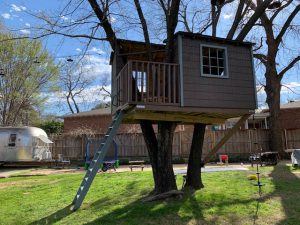I used to think that providing for my family meant working as much as possible. The COVID-19 quarantine allowed me to revisit that notion.

The Law of Diminishing Returns is something that anyone learns in an introductory economics course. The law is used to refer to a point at which the level of profits or benefits gained is less than the amount of money or energy invested. This is an easily grasped concept for people because it is evident in so many real-world situations. Of course, if a factory employs workers to manufacture its products, and is operating at an optimal level, then with other production factors constant, adding additional workers beyond this optimal level will result in less efficient operations.
The Law of Diminishing Returns also hits us in more human ways. Like last weekend when I was cooking dinner for my family. This was a particularly fun dinner to cook because I got to pull out my sous vide equipment and use it on some delicious rib-eyes from Gloria Starling at Capital Grille. The great thing about sous vide is that you really can’t screw it up; you get perfect steaks every time. And these steaks exceeded all expectations. The first bite was everything you’d want in a high-dollar steakhouse experience – delicious and full of flavor. By the end of my 24-oz. steak, the last bite was still good, but as incredible as the first? No. There was definitely a point during this meal where I should have called it quits and avoided feeling almost painfully full.
Besides cooking more for my family, the recent COVID-19 quarantine has changed my daily routine immensely and made my work life and my home life inextricably linked. Before quarantine, I usually got up 30 minutes to an hour before everyone else to catch up on emails, helped get kids ready for school, worked at my office from 8:30am to around 6:30pm, spent an hour or so with the kids, finally got some quiet time to eat dinner with my fabulous wife, Laurie, and then spent another 2-3 hours working in bed. We’ve been talking about work-life balance for over a decade now, but many people (including me) are not very good at it. I had become almost resigned to the fact that running my business the way I thought it needed to operate meant being apart from my family.
In quarantine, specifically during Fort Worth’s stay-at-home order which lasted until April 30th, the core of my work didn’t change much at all. I continued to work hard and deliver for my clients, but I was also able to go bike riding with my six-year-old, Harrison. I finished building a treehouse for my kids and started on a massive restoration project of an old 1969 Airstream trailer. Was forgoing these activities to get a final few hours in at work actually worth it all this time? Of course not. And then again, the Law of Diminishing Return rears its head in the form of some sobering perspective. While in quarantine I have found more time with the kids for baseball and the like, but I also found more energy, compassion, peace, and I am sleeping better than I have in years. I have found an amazing blessing during this time: balance.
And science actually backs this up. 55 hours per week is considered a hard ceiling on productivity. In a 2014 study from Stanford University, economics professor John Pencavel found that productivity per hour declines sharply when a person works more than 50 hours a week. After 55 hours, productivity drops so much that putting in any more hours would be pointless. And, those who work up to 70 hours a week are only getting the same amount of work done as those who put in the 55 hours. Pencavel’s research also points to the increased accidents and mistakes that occur when working excessively. Yet despite so many good reasons, including health benefits, to find a work-life balance, the idea that the hours you work are directly related to the value you bring to your company is still so pervasive.
We just experienced a downshift in conventional work. Work did not stop, but it took on a different form, and many of us had to get creative to keep our businesses moving forward or staying afloat. So, as we begin to return to the traditional ways of working, why don’t we try to not revert back to exactly what we were doing before? If we start to see our work through the lens of the Law of Diminishing Returns, maybe we will realize that sometimes the 11pm email might be better, more contextual, and more useful the next morning. Work-life balance shouldn’t just feel like a buzzword. It is a true possibility with real rewards.
The big lesson of COVID, for me? Work is powerful and purposeful, but there’s beauty in evening baseball and Airstream trailers too.